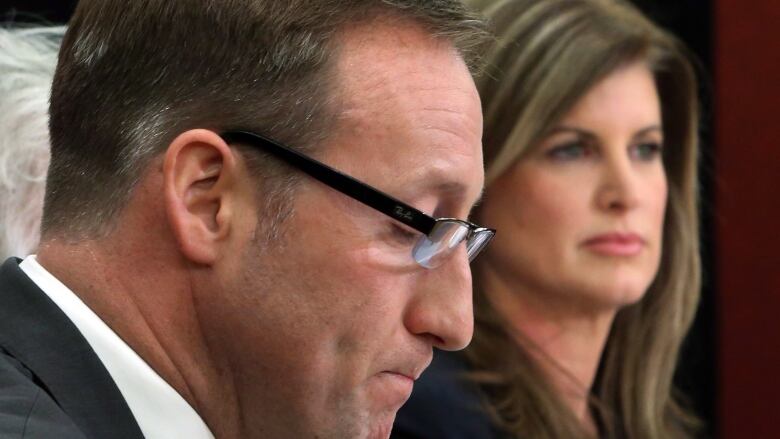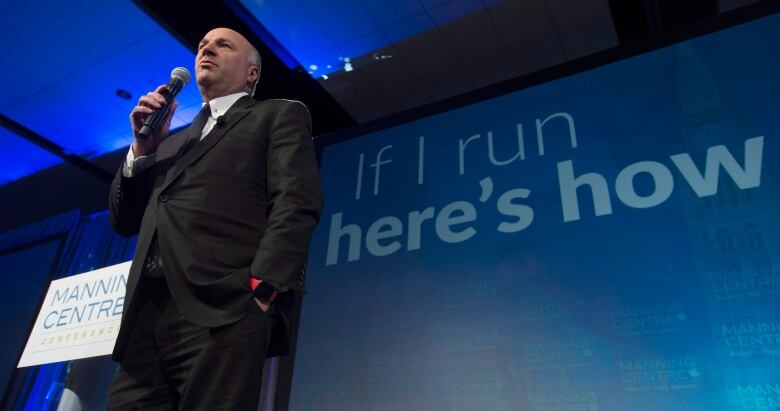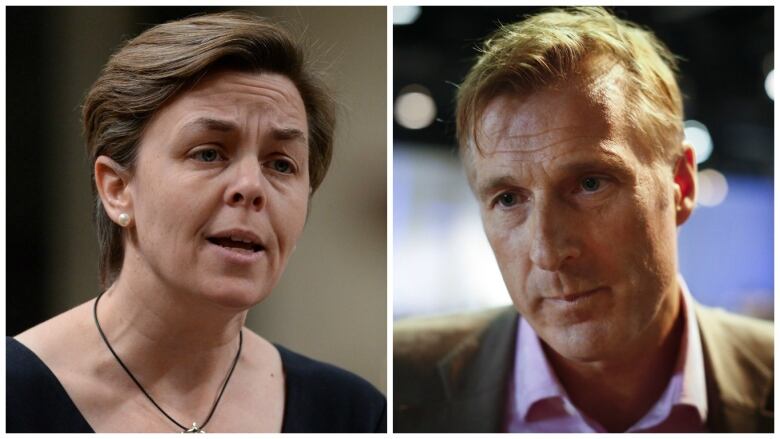Ambrose, MacKay, or O'Leary? What leadership polls tell us about the Conservative race
Name recognition the biggest factor at this stage of the race, but polls still have something to tell us

Rona Ambrose was chosen as the Conservative Party's interim leader six months ago, thereby ruling herself out of contention for the permanent job.
But just as quickly as some Conservatives began to organize to change the rules to allow her to run for the permanent leadership, Ambrose has ruled herself out yet again.
A recent poll, however, suggests she would be the favourite choice of Conservative supporters, which might increase the pressure on Ambrose to go back on her pledge. But what can really be gleaned from leadership polls with more than a year to go before the actual vote?
- Rona Ambrose made 'solemn vow' not to run for Tory leadership, Clement says
- Kellie Leitch tears up over role in barbaric practices tip line
- Maxime Bernier enters the race to lead Tories into next election
If early leadership polls had been prescient, then-Alberta PremierRalph Klein would have taken over for Jean Charest as federal Progressive Conservative leader in 1998and Frank McKenna, former premier of New Brunswick, would have led the Liberals into the 2008 federal election instead of Stphane Dion. Neither ended up running for those leadership titles.
So early leadership pollshave limited value. Nevertheless, there is some information that can be divined from the tea leaves.
Peter MacKay, Kevin O'Leary lead early polls
As has been the case for much of the time since he gave up the Progressive Conservative leadership and merged thatparty with the Canadian Alliance in 2003, former Nova Scotia MP and cabinet minister Peter MacKay has been the front-runner in early leadership polls.
Surveys conducted over the last month have given him the support of between 22 and 23 per cent of Conservative voters. His support is particularly strong in his home region of Atlantic Canada, though his support is also relatively uniform he has no region of great weakness.
-
Peter MacKaynot ruling out run for leader of federal Conservative Party
-
ANALYSIS:Kevin O'Leary and Peter MacKay top Tory leadership poll
This is in large part because MacKay is one of the best known of the potential leadership candidates, and familiarity is extremely important in polling at this stage. This is partly shown by the support another candidate has.
Kevin O'Leary(of Dragon's Denfame)has routinely scored about as well as MacKay, with recent polls giving him between 17 and 24 per cent support among Conservative voters.

No other potential candidate beyond these two, apart from Rona Ambrose and Stephen Harper (in an encore performance), has polled in double-digits in any poll.
But O'Leary who has mused he would even considertaking over the Liberal leadership fromJustin Trudeau may never throw his hat in the ring.
Among those who have, however, Conservatives have mostly shrugged.
Only two candidates have officially entered the race: Ontario MP Kellie Leitch and Quebec MP Maxime Bernier. The polls do not suggest that either is catching fire. Bernier has scored between fourand eightper cent in recent surveys, while Leitch has only managed between oneand threeper cent.
Bernier, however, does appear to have a regional base of support. A recent poll gave him 18 per cent support among Conservatives in Quebec, putting him in a tie with O'Leary and only a few points behind MacKay in the province.
Profile boost may not be enough
That MacKay and O'Leary have a higher national profile than their rivals, and that Bernier is better known in Quebec, may be what is driving most of their support.
Mainstreet Research recently found that just one-third of Conservatives were either unfamiliar with or unsure of their opinion of O'Leary and MacKay, by far the lowest levels of unfamiliarity for those polled (with the exception of Ambrose).
By comparison, 69 per cent ofConservatives were unsure of or unfamiliar withBernier, while 76 per cent said the same for Leitch. It may be no coincidence, then, that O'Leary and MacKay find themselves at the top of the pack in support and Bernier and Leitch at the bottom.

Similarly, other potential candidateslike Ontario MPs Lisa Raitt and Michael Chongalso score very highly on the unknown meter. They accordingly poll very low on support.
More revealing might be the support levels of Ontario MP Tony Clement and Alberta MP Jason Kenney. About half of Conservatives had an opinion of them not a bad level of notoriety at this stage. But neither polled very highly on support, and Clement's favourable-to-unfavourable ratio was poorer than some of his rivals: 30 per cent of Conservatives had a good opinion of him, compared to 19 per cent with a bad one.
Leitch and Bernier may have more problems than their lack of profile, too. Among those with an opinion of her, Leitch had as many favourable as unfavourable opinions. Bernier only had slightly more Conservatives (18 per cent) expressing a positive view than those with a negative view of him (13 per cent).
Gaining in profile, then, may not help these two if they don't get Conservatives to view them more favourably as well.
What about Rona?
When included in the list,Rona Ambrose scored better than any other candidate in thepoll by Mainstreet. She managed 26 per cent among Conservative supporters, ahead of both O'Leary and MacKay.
Ambrose also scored highly at a personal level, with a favourabilityrating of 68 per cent among Conservative voters. Only 11 per cent had an unfavourable view of the interim leader.
But though Ambrose might be seen by some Conservatives as a potential saviour after the 2015 defeat, the polls do not suggest that Canadians as a whole agree.
With Ambrose as leader today, the Conservative Party is still routinely polling below its 2015 support levels. And a poll published Tuesday by Nanos Research found that just 15 per cent of Canadians preferred Ambrose as prime minister, compared to 52 per cent for Justin Trudeau(and 11 per cent for NDP Leader Tom Mulcair).
Ambrose has not scored better than 18 per cent in Nanos's rolling weekly polls since taking over the interim job.
She may be scoring well out of a group of potential Conservative candidatesand Tories may feel that she is performing well in the interim position. Canadians, however, don't quite seem to see her as the quick-fix solution some Conservatives do.
- The Pollcast: Subscribe to ric Grenier's podcast
- The Pollcast: Your primer on the Conservative leadership race
The poll by Mainstreet Research for Postmedia was conducted between April 26 and 27, 2016, interviewing 1,676 decided and leaning Conservative voters via interactive voice response. A probabilistic sample of this size would yield a margin of error of +/- 2.4 per cent, 19 times out of 20.
The poll by Nanos Research was conducted between April 3 and 29, 2016, interviewing 1,000 adult Canadians via the telephone. A probabilistic sample of this size would yield a margin of error of +/- 3.1 per cent, 19 times out of 20.












_(720p).jpg)


 OFFICIAL HD MUSIC VIDEO.jpg)
.jpg)



























































































